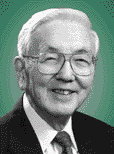Tips from an Editor: Bill Hosokawa
A newspaper's editorials are that publication's voice. They should reflect
the thinking of the newspaper's owner or editor on a variety of current
issues important to its readers. They may relate to politics, economics,
the performance of the mayor and the wisdom or follies of city council,
or the triumphs or failures of the sports teams important to the community.
They don't have to be ponderous; they may extol the beauty of a spring
morning or the awe inspired by the "V" of migrating geese etched
against the sky.
Editorials, by their nature, are opinionated. Editorials
may praise or condemn, chide gently or thunder and road in protest. But
it is imperative that they be accurate as to the facts. That means the
editorial writer must research the subject exhaustively and weigh the
findings carefully. It is important not to mislead the reader by distortion
or untruths.
It is no sign of weakness for the editorial to admit that
there are other points of view, that "on the other hand" there
are persuasive arguments or extenuating circumstances. The objective is
to help the reader to your point of view by the superiority of your logic
and persuasion.
Since editorials are opinion, they do not necessarily
have to be fair. But it is essential that they be factually accurate.
Their gravest sin is dullness. Their greatest triumph is when the reader
is moved to say, "Hey, that makes sense," or "What a beautiful
piece of writing."
– Bill Hosokawa
 In
1941, Seattle-born William K. Hosokawa (1915-) is a reporter. After the
war begins, he is a prisoner. Hosokawa spends 18 months with other Japanese
Americans in a Wyoming internment camp. He edits the camp paper, the Heart
Mountain Sentinel, striving for press freedom. After the war, he works
for 37 years at the Denver Post, eventually as editorial-page editor. In
1941, Seattle-born William K. Hosokawa (1915-) is a reporter. After the
war begins, he is a prisoner. Hosokawa spends 18 months with other Japanese
Americans in a Wyoming internment camp. He edits the camp paper, the Heart
Mountain Sentinel, striving for press freedom. After the war, he works
for 37 years at the Denver Post, eventually as editorial-page editor.
|


